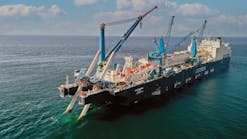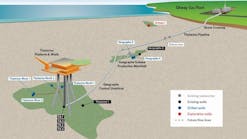Offshore staff
LONDON – Britain’s Chancellor George Osborne has offered various fiscal incentives to the UK’s hard-pressed oil and gas industry in his annual budget.
These include a reduction in Corporation Tax and the effective abolition ofpetroleum revenue tax by permanently reducing the rate from 35% to 0%, and a reduction in the supplementary charge from 20-10%, both with effect from Jan. 1, 2016.
In addition, the government has pledged a further £20 million ($28.7 million) of funding for a new round ofseismic surveys in UK waters in 2016-17, and will extend Investment and Cluster Area Allowances to include tariff income, the aim being to encourage investment in infrastructure maintained for the benefit of third parties.
Further, Osborne’s measures should provide greater certainty that companies will be entitled to tax relief on decommissioning costs when they retaindecommissioning liabilities for a UK offshore asset after a sale.
The government has reaffirmed its commitment to work more with theOil and Gas Authority to reduce overall decommissioning costs, and will consider proposals for using the UK Guarantees Scheme for infrastructure to help secure new investment in assets of strategic importance, in order to maximize economic recovery of oil and gas.
Oil & Gas UK’s chief executive Deirdre Michie welcomed the Chancellor’s acknowledgment of the challenges facing the industry. The budget will reduce the headline rate of tax paid on UK oil and gas production from 50-67.5% to 40% across all fields.
“We will continue to work with the Treasury to complete its ‘Driving Investment’ plan to ensure that the fiscal regime reflects the business needs of a maturing basin and signals to global investors that the UK is truly open for business,” Michie said.
The certainty on the availability of decommissioning tax relief should also assist the asset trading market, while the further adjustment to the Investment Allowance to facilitate investment in infrastructure should support the UK’s drive to maximize economic recovery from its remaining reserves, the association added.
The industry has been badly affected by the drop in oil price with investment falling sharply, with nearly half of all oil fields making losses and tens of thousands of jobs lost over the past 18 months.
Derek Leith, EY Head of Oil & Gas Tax, was less complimentary in his verdict. “Today’s announcement of a 10% cut in corporate taxes, and the effective abolition of Petroleum Revenue Tax for the UK oil and gas sector will fall short of industry expectations,” he said.
“Since 2011 there has been a compelling case to lower the tax burden to recognize the maturity of the basin, the high cost base, and the falling production efficiency of older assets which support vital offshore infrastructure.
“The case for a significant change to the oil and gas regime has been exacerbated by the collapse in the oil price. Decisive action by the government was required to send a strong signal to investors.
“Today’s changes, while welcome, are a missed opportunity to be more radical and abolish supplementary charge completely which would have simplified the regime by sweeping away the complexity of investment allowance and its interaction with decommissioning losses.”
Martin Findlay, senior tax partner with professional services firm KPMG in Aberdeen, said: “The reductions in headline tax rates for the oil and gas industry announced by the Chancellor, backdated to the start of 2016, are welcome and will help to create a more attractive fiscal framework for this strategically significant industry.
“In the medium to long term, this should make a positive contribution to the maximizing economic recovery agenda for the UKCS. However the headline £1 billion [$1.434 billion] of tax impact is the total over five years, with the relatively modest annual impact being a direct result of relatively low tax take.
“However, tax reductions in themselves can only ever be part of the solution, particularly in the short term when the prevailing market conditions are forcing the industry to address its operating models and cost base with significant collateral damage.
“Maximizing production from UK oil and gas fields will only be achieved by reducing unit cost of production and driving through operator and supply chain efficiencies, no matter how painful these are. The industry must therefore continue to pursue sustainable cost reduction measures and new ways of working and collaborating, which will better position it to maximize the North Sea opportunity when the commodity price recovers.”
03/17/2016
Share your news withOffshore at [email protected]




